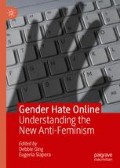Abstract
In recent years, the scale and intensity of anti-feminist sentiment online has become a cause for serious concern, not only among feminist activists but also for any woman expressing opinions or exerting influence in digital spaces. Women have been verbally abused, doxed, and sent rape and death threats. They have been cyberstalked, photoshopped into pornography and had intimate images of themselves shared. Their websites have been hacked and, in many cases, their livelihoods have been sabotaged (Jane 2018). An Amnesty report published in 2017 showed that almost a quarter (23%) of the women surveyed across eight countries said they had experienced online abuse or harassment at least once, ranging from 16% in Italy to 33% in the US. Across all eight countries, just under half (46%) of women responding to the survey who had experienced online abuse or harassment said it was misogynistic or sexist in nature. This introductory chapter provides a broad contextual framework for Gender Hate Online, mapping out the key socio-historical shifts in the history of feminism(s) and anti-feminism(s). It also summarizes and contextualizes the various contributions, which move from an understanding of the current moment through specific articulations of anti-feminism and misogyny to women’s own efforts to address gender violence online.
Access this chapter
Tax calculation will be finalised at checkout
Purchases are for personal use only
Notes
- 1.
Daily Express, February 1994.
- 2.
Daily Mail, March 1996.
- 3.
- 4.
- 5.
See http://www.ukmm.org.uk/ (campaigns).
- 6.
- 7.
The speech is found here: https://sourcebooks.fordham.edu/mod/sojtruth-woman.asp. The crucial passage reads: “That man over there says that women need to be helped into carriages, and lifted over ditches, and to have the best place everywhere. Nobody ever helps me into carriages, or over mud-puddles, or gives me any best place! And ain’t I a woman? Look at me! Look at my arm! I have ploughed and planted, and gathered into barns, and no man could head me! And ain’t I a woman? I could work as much and eat as much as a man—when I could get it—and bear the lash as well! And ain’t I a woman? I have borne thirteen children, and seen most all sold off to slavery, and when I cried out with my mother’s grief, none but Jesus heard me! And ain’t I a woman?”
References
Bailey, M., & Trudy. (2018). On Misogynoir: Citation, Erasure, and Plagiarism. Feminist Media Studies, 18(4), 1–7.
Brownmiller, S. (2013). Against Our Will: Men, Women and Rape. New York: Open Road Media.
Bush, J. (2018) The Anti-Suffrage Movement. The British Library. Retrieved from https://www.bl.uk/votes-for-women/articles/the-anti-suffrage-movement.
Butler, J. (1997). Excitable Speech: A Politics of the Performative. New York: Routledge.
Carroll, H. (2011). Affirmative Reaction: New Formations of White Masculinity. Durham, NC: Duke University Press.
Connell, R. W. (2002). Gender. Cambridge: Polity.
Cornell, D. (1998). At the Heart of Freedom: Feminism, Sex, and Equality. Princeton, NJ: Princeton University Press.
Coward, R. (2000). Sacred Cows: Is Feminism Relevant to the New Millennium? London: Harper Collins Publishers.
Crenshaw, K. (1990). Mapping the Margins: Intersectionality, Identity Politics, and Violence Against Women of Color. Stanford Law Review, 43, 1241.
Cronin, A. (2007). Socialist Feminism. In The Blackwell Encyclopedia of Sociology. Oxford: Blackwell.
Dworkin, A. (1974). Woman Hating. New York: Dutton.
Dworkin, A. (1981). Men Possessing Women. New York: Perigee.
Echols, A. (1989). Daring To Be Bad: Radical Feminism in America, 1967–1975 (Vol. 3). Minneapolis, MN: U of Minnesota Press.
Faludi, S. (1992). Backlash: The Undeclared War Against American Women. London: Chatto and Windus.
Faludi, S. (1999). Stiffed: The Betrayal of the American Man. New York: Harper Collins.
Federici, S. (2004). Caliban and the Witch. Brooklyn, NY: Autonomedia.
Gauntlett, D. (2002). Media, Gender, and Identity: An Introduction. London and New York: Routledge.
Gill, R. (2016). Post-postfeminism?: New Feminist Visibilities in Postfeminist Times. Feminist Media Studies, 16(4), 610–630.
Ging, D. (2017). Alphas, Betas, and Incels: Theorizing the Masculinities of the Manosphere. Men and Masculinities. https://doi.org/10.1177/1097184X17706401.
Ging, D., & Siapera, E. (2018). Special Issue on Online Misogyny. Feminist Media Studies, 18(4). https://doi.org/10.1080/14680777.2018.1447345.
Hanke, R. (1998). Theorizing Masculinity Within the Media. Communication Theory, 8, 183–203.
Hooks, B. (1981). Ain’t I a Woman: Black Women and Feminism. London: Pluto Press.
Jane, E. A. (2018). Gendered Cyberhate as Workplace Harassment and Economic Vandalism. Feminist Media Studies, 1–17.
Kimmel, M. (2015). Angry White Men: American Masculinity at the End of an Era. New York: Nation Books.
Nagle, A. (2016). The New Man of 4/Chan. The Baffler, p. 30. Retrieved June 6, 2016, from http://thebaffler.com/salvos/new-man-4chan-nagle.
Neibaur, J. (1989). Tough Guy: The American Movie Macho. Jefferson, NC: McFarland.
Nussbaum, M. (2000). The Future of Feminist Liberalism. Proceedings and Addresses of the American Philosophical Association, 74, 47–79.
Okin, S. M. (1989). Justice, Gender and the Family. New York: Basic Books.
Papacharissi, Z. (2015). Affective Publics: Sentiment, Technology, and Politics. Oxford: Oxford University Press.
Pustela, M. (2018, May 25). Repealing the “Right to Object”, in Jacobin. Retrieved from https://jacobinmag.com/2018/05/italy-abortion-conscientious-objection-feminism.
Savran, D. (1998). Taking It Like a Man: White Masculinity, Masochism, and Contemporary American Culture. Princeton: Princeton University Press.
Wagner, P. (2012). Modernity. Cambridge: Polity.
Walby, S. (1990). Theorizing Patriarchy. Oxford: Basil Blackwell.
Walter, N. (1999). The New Feminism. London: Virago.
Author information
Authors and Affiliations
Corresponding author
Editor information
Editors and Affiliations
Rights and permissions
Copyright information
© 2019 The Author(s)
About this chapter
Cite this chapter
Ging, D., Siapera, E. (2019). Introduction. In: Ging, D., Siapera, E. (eds) Gender Hate Online. Palgrave Macmillan, Cham. https://doi.org/10.1007/978-3-319-96226-9_1
Download citation
DOI: https://doi.org/10.1007/978-3-319-96226-9_1
Published:
Publisher Name: Palgrave Macmillan, Cham
Print ISBN: 978-3-319-96225-2
Online ISBN: 978-3-319-96226-9
eBook Packages: Literature, Cultural and Media StudiesLiterature, Cultural and Media Studies (R0)

